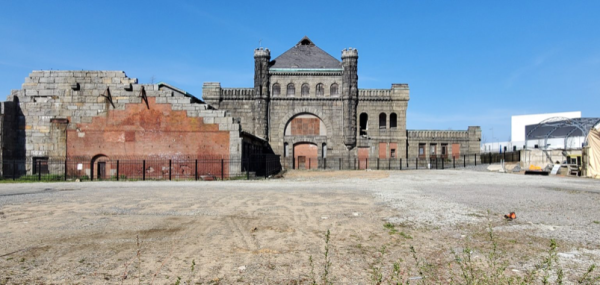May 2, 2024

The iconic Calf Pasture Pumping Station on Columbia Point. Boston Landmarks Commission photo The iconic Calf Pasture Pumping Station on Columbia Point. Boston Landmarks Commission photo
The Boston Landmarks Commission took a step last week that was years in the making by approving an affirming study report on the Calf Pasture Pumping Station on Columbia Point. All that remains is a vote to officially designate the site, which is owned by the UMass Building Authority, as a Boston landmark.
“I would have to put this study into the category of ‘oldies-but-goodies,’” said commissioner Jeff Gonyeau, a Dorchester resident, at the April 23 hearing. “I think it’s further proof that while something can languish on our list for a while – decades, in some cases – that that does not make it less relevant than it was decades ago.”
The 141-year-old facility, which was in use until 1968, overlooks Dorchester Bay and consists of three buildings that, together, make up one of the country’s first effective sewerage systems. According to the report, which was released at the beginning of April, the site “represents significant achievements in technology, social reform, and architectural design in the late 19th century.”
“I think this is a great thing that’s occurred,” said Earl Taylor, president of the Dorchester Historical Society. “I was one of the original petitioners to get it designated as a Boston landmark.”
UMass Boston has expressed an interest in developing the site for campus use, but any effort in that regard would likely be limited, given the protections that come along with designation as a Boston landmark.
However, Kathleen Kirleis, a UMass Boston representative who attended the hearing, expressed support for the landmark designation, saying, “we are prepared to be a partner with the Commission in preserving the history of the Calf Pasture Pump Station for the future.”
The university indicated that there will be developments – like a parking lot – on parts of the property.
“I’ve always found the commission to be quite reasonable in terms of accommodation to other plans and priorities,” the Historical Society’s Taylor said. “They don’t want to prevent other priorities from being accomplished. They just need to preserve the significant soil of our history.”
The commission’s approval of the report did not occur without reference to a Reporter story about a letter addressed to Mayor Wu on April 9, wherein all 16 volunteer commissioners criticized her for not giving them enough authority to carry out their state law-sanctioned responsibilities. Their long-time executive director, Rosanne Foley, was removed from her post by Wu ten days later.
“I applaud the staff for all their efforts to bring these reports to us and to push these processes forward, even though it could take a really long time, in some cases,” Gonyeau said. “And, were we adequately resourced, it would take a lot less time.”



